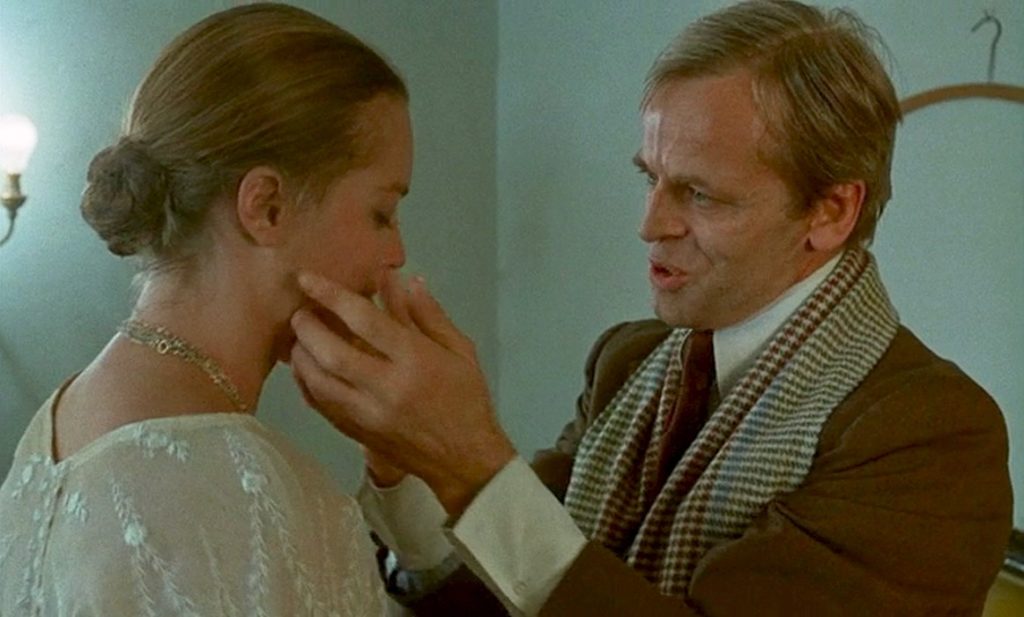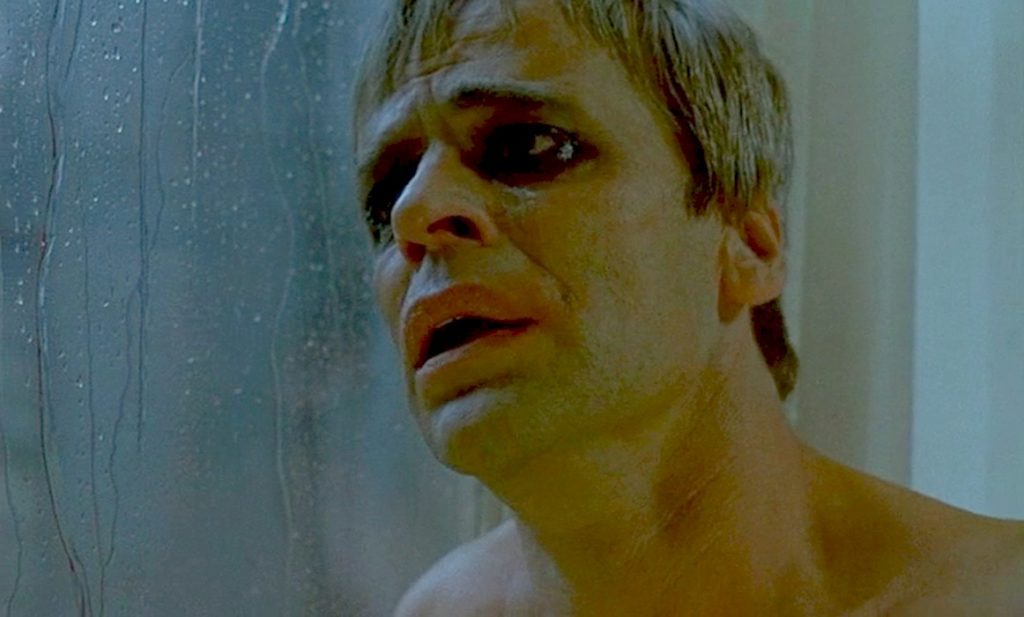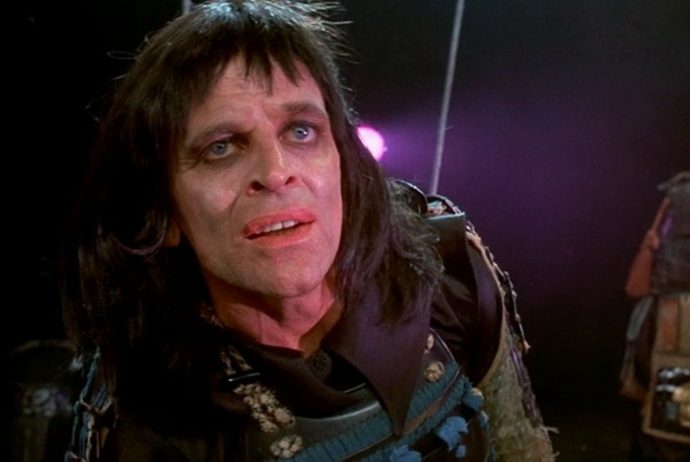Dir: Andrzej Zulawski
Star: Fabio Testi, Romy Schneider, Jacques Dutronc, Klaus Kinski
a.k.a. That Most Important Thing: Love
This is the kind of film they just don’t make any more. Well, at least not in the sense of “mainstream” cinema. The year it came out, this was among the thirty most successful movies at the French box-office, with basically the same number of tickets sold there as Rollerball. Even allowing for the difference in cultures between the two countries, anyone remember the last relationship-based drama to make the annual top thirty at the box-office in the US or UK? I don’t say this out of any sense of elitism or snobbery – not least because this is typically the sort of movie I would usually run a million miles from. I prefer my cinema to be loud, flashy and ostentatious, rather than angst-ridden and, to be honest, not much more than tarted-up soap-opera. But Project Kinski plays no favorites, so here I am, watching two broken French people colliding like icebergs.
The central character is Servais Mont (Testi), a photographer who is forced to make a living in various dubious ways, such as shooting blackmail photos at an orgy, for the mob. He sneaks on to a film set and sees actress Nadine Chevalier (Schneider) being abused by her director in order to get the performance she wants, the actress breaking down in tears on set. Chevalier was once a top-tier starlet, but now at the ripe old age of 30 (!), is reduced to playing in B-movies. Her last film was the wonderfully-titled Nymphocula – hey, I’d go see it! We later learn from an enthusiastic endorsement by Klaus’s character, that this was, “Two dykes in a castle with a dwarf”. Hey, I’d still go see it. Servais becomes infatuated with Nadine, and begins a relationship with her, to the near-apathy of her gay husband, Jacques (Dutronc).

Hoping to revive her career, Servais borrows twenty thousand dollars from his pals in the mob, despite having only just got out from under his previous obligation to them. This was incurred in order to pay back debts incurred by Servais’s father – he has a noble yet self-destructive willingness to put himself in harm’s way, in order to help others. He uses the money here to fund a production of Shakespeare’s Richard III, in which Nadine will play Lady Anne. In the title role is German actor Karl-Heinz Zimmer (Kinski). It’s a rather radical reworking of the classic, for example, with the medieval English soldiers sporting samurai armor, and the press is not kind to it, to say the least. Nadine’s despair only deepens, and she is increasingly torn between Servais and Jacques, due to her sense of obligation towards her husband. He takes care of that by overdosing on pills and committing suicide, leaving Nadine and Servais staring into an uncertain future.
The production company for which Zulawski is filming can’t sign a contract with me because the German distributor, who’s co-financing the project, doesn’t want me. The reason is that the miserable maggot who’s negotiating with the French company wants to get back at me. Years and years ago, he had the hots for Erika when I was fucking her. But Erika wanted to screw only with me. That’s why this maggot hated me. Zulawski says he won’t make the movie without me. I don’t give a shit about the film. I need bread.
Kinski Uncut, pp.236-237

Interestingly, the above section is not present in All You Need is Love, one of the cases where Kinski Uncut actually does live up to its title. Kinski was able to work around the problem because, according to his version, he was having an affair with “Sabine”, who is simultaneously having an affair with “Herr Von S.” who runs the distributor’s Munich branch and is the boss of the producer working with Zulawski. Through that connection, Kinski gets the job. As ever, take his version with a pinch of salt, but on the commentary track for the DVD, the director did apparently say that Kinski punched one of the producers and called him a Naz. This would appear to confirm that the relationship was at least somewhat fraught! Not that Kinski particularly cared for the end product, calling it a page or two later, “Zulawski’s intellectual jerking off.”
I mean, he’s not wrong. This is Arthouse Cinema with a capital A, R and T. I do admit, there are points where it is extraordinarily well-acted, and it’s easy to see why Schneider became the first ever recipient of the Cesar (France’s equivalent of the Oscars) for Best Actress. One scene near the end, her character and Servais are talking in a restaurant, which escalates into a hysterical outburst that’s almost painful to watch. Though I am impressed with the apparent stoicism of French consumers: the only person to pay any attention is the waiter, and he’s mostly concerned about the resulting mess. Kinski is perhaps the sole actor here who can stand up to the incandescence of Schneider when she lets loose. On the re-release in 2017, the New York Times review said the part was “played by Klaus Kinski at full Kinski volume.” They’re not wrong either.
Witness the scene just after the scathing review has been read to him. Zimmer fabricates a reason to take offense with a passer-by, beats him up and walks off with both of his victim’s two lady friends. To be honest though, I can’t blame him. I would watch the hell out of Klaus Kinski playing Richard III and any critic who could not see the appeal of that, is not one whose opinions I can take seriously. I did attempt to clip out a subtitled version, but two different, and usually very reliable, video conversion programs both coughed up a hairball when I tried. So you will have to make do with this untranslated clip above, which has Kinski giving the famous, “Now is the winter of our discontent” speech from the play. Still, even in French, it’s a hypnotic rendition, and I just wish there was a version of the whole play available.
